Related Research Articles

The Council of the European Union, often referred to in the treaties and other official documents simply as the Council, and informally known as the Council of Ministers, is the third of the seven Institutions of the European Union (EU) as listed in the Treaty on European Union. It is one of two legislative bodies and together with the European Parliament serves to amend and approve or veto the proposals of the European Commission, which holds the right of initiative.

A European Capital of Culture is a city designated by the European Union (EU) for a period of one calendar year during which it organises a series of cultural events with a strong pan-European dimension. Being a European Capital of Culture can be an opportunity for a city to generate considerable cultural, social, and economic benefits, and it can help foster urban regeneration, change the city's image, and raise its visibility and profile on an international scale. Multiple cities can be a European Capital of Culture simultaneously.

The president of the European Council is the person presiding over and driving forward the work of the European Council on the world stage. This institution comprises the college of heads of state or government of EU member states as well as the president of the European Commission, and provides political direction to the European Union (EU).
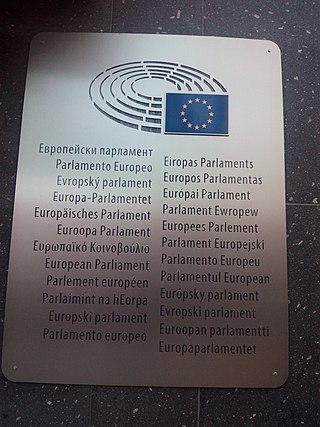
The European Union (EU) has 24 official languages, of which three – English, French and German – have the status of "procedural" languages of the European Commission. The three procedural languages are those used in the day-to-day workings of the institutions of the EU.

The Lifelong Learning Programme 2007–2013 was the European Union programme for education and training.

Ján Figeľ is a Slovak politician. Figeľ served as European Commissioner from 2004 to 2009, then as Slovak minister of Transports from 2010 to 2012. From 2016 to 2019 he was European Commission special envoy for the promotion of freedom of religion outside the EU.

European Union culture policies aim to address and promote the cultural dimension of European integration through relevant legislation and government funding. These policies support the development of cultural activity, education or research conducted by private companies, NGO's and individual initiatives based in the EU working in the fields of cinema and audiovisual, publishing, music and crafts.
In the European Union education is at the responsibility of its Member States and their Ministries of education that they have; in such, the European Union institutions play only a supporting and overseeing role. According to Art. 165 of the Treaty on the Functioning of the European Union, the Community
shall contribute to the development of quality education by encouraging cooperation between Member States, through actions such as promoting the mobility of citizens, designing joint study programmes, establishing networks, exchanging information or teaching languages of the European Union. The Treaty also contains a commitment to promote life-long learning for all citizens of the Union.
The European Association of History Educators (EuroClio) was established in 1992 with the support of the Council of Europe. The NGO works as a European wide facilitator for innovation and progress in history Education. The organisation contributes not only to the development, but also on the actual implementation of regional, national and European long-term projects, which focus on establishing knowledge, experience and expertise in the countries by training and consulting teachers. EuroClio develops teaching materials, builds and maintains professional Networks and acts as advisor to governments, international organisations, NGOs, History Teacher Associations and other Organisations. EuroClio is supported by the Europe for Citizens Programme of the European Union and has, for many years, Official Participatory Status and is part of the EU Stake Holder's Network in Education and Training.

Leonard Orban is a Romanian independent technocrat who served as the Commissioner for Multilingualism in the European Commission, the executive body of the European Union (EU). He was responsible for the EU language policy and was the first Romanian Commissioner and the first member of the Commission whose portfolio is exclusively multilingualism. His term of office began on 1 January 2007 and ended on 9 February 2010. With a background in engineering and economics, Orban has taken up various posts working for the accession of Romania to the European Union, most prominently as Deputy and later as Chief Negotiator for his country at the time of final negotiations with the European Union.
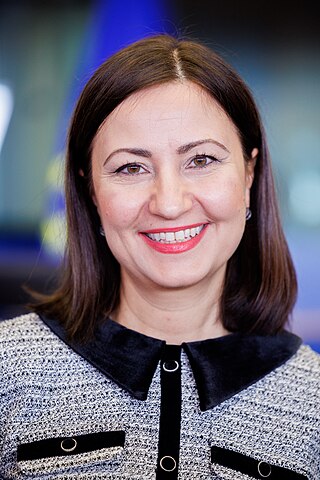
The European Commissioner for Innovation, Research, Culture, Education and Youth is a member of the European Commission. The portfolio was previously titled European Commissioner for Education, Culture, Youth and Sport until 2019 when it was merged with the European Commissioner for Research, Science and Innovation to form its current title.
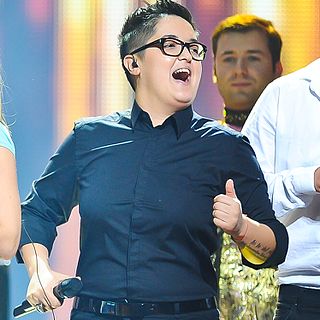
Marija Šerifović is a Serbian singer. Born in Kragujevac, she is best known for winning the Eurovision Song Contest 2007 in Helsinki, Finland with "Molitva", becoming Serbia's first and to date only winning entry.
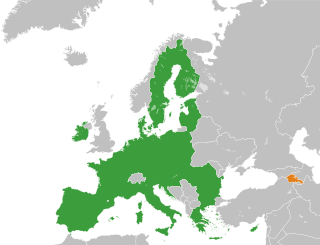
Armenia and the European Union have maintained positive relations over the years. Both parties are connected through the Comprehensive and Enhanced Partnership Agreement (CEPA), which was signed in 2017. Former Armenian Foreign Minister Eduard Nalbandyan expressed confidence that the new partnership agreement would "open a new page" in EU–Armenia relations. Meanwhile, the former High Representative of the Union for Foreign Affairs and Security Policy, Federica Mogherini concluded in June 2019, that Armenia–EU relations are on an "excellent" level. Should either Georgia or Turkey, who are candidates for EU membership, accede to the EU, Armenia will border the European Union.

The North–South Centre, officially the European Centre for Global Interdependence and Solidarity, is a Partial Agreement of the Council of Europe, the oldest political organisation of European states.

The accession of Kosovo to the European Union (EU) is on the current agenda for future enlargement of the EU. Kosovo is currently recognized by the EU as a potential candidate for accession.
Almost 80 million people live below the poverty line in the European Union.

European Union–Pakistan relations are the international relations between the common foreign policy and trade relations of the European Union and the Islamic Republic of Pakistan. There has been no EU State Leader's visit for over twenty years.
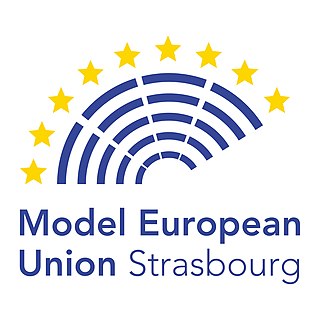
Model European Union Strasbourg (MEUS) is the original simulation of the European Union's legislative process organised by BETA France. It was initiated in the spring of 2007 by a group of university students and gathers around 180 young people from across Europe in the Seat of the European Parliament in Strasbourg, France annually.
Intercultural dialogue (ICD) builds upon the concept of dialogue, which refers to at least two people holding a conversation. And it builds upon the term intercultural, which is typically used to refer to people communicating across differences in nationality, race and ethnicity, or religion. Dialogue has several meanings: it sometimes refers to dialogue in a script, which simply means people talking, but more often it refers to "a quality of communication characterized by the participants' willingness and ability simultaneously to be radically open to the other(s) and to articulate their own views. ... Dialogue's primary goal is understanding rather than agreement."
References
- ↑ Summary of Flash Eurobarometer December 2007
- ↑ Discussion paper based on the Forum
- ↑ e.g., Pope Benedict XVI speaking to Ambassadors from countries with a Muslim majority Rome 25 September 2006
- ↑ e.g. the Vermont Intercultural Dialogue and Encounters Initiative
- ↑ cf, for example, the description of intercultural dialogue in Germany
- ↑ cf, for example, the BBC report of Iranian President Khatami's speech at the UNESCO forum on Dialogue between Civilisations, October 1999
- ↑ Decision No 1983/2006/EC of the European Parliament and the Council of 18 December 2006 concerning the European Year of Intercultural Dialogue (2008)
- ↑ "DG EAC – European Year of Intercultural Dialogue (2008) – Home". Archived from the original on 31 December 2007. Retrieved 10 January 2008.
- ↑ "Home EN – European Year of Creativity and Innovation 2009 – EUROPA". Archived from the original on 13 March 2009. Retrieved 16 March 2009.
- ↑ "Press corner".
- ↑ "Home | European Year of Volunteering 2011".
- ↑ "2012 to be the European Year for Active Ageing".
- ↑ "European Year of Citizens 2013 – European Commission".
- ↑ Decision No 472/2014/EU of the European Parliament and of the Council of 16 April 2014 on the European Year for Development (2015)
- ↑ see press release following the Education, Youth and Culture Council of the European Union|Council of Ministers of the EU of 16 February 2007, under any other business (page 10)
- ↑ see, for example, the Lifelong Learning Programme 2007-2013 or the ERASMUS programme
- ↑ full text
- ↑ see, for example, the project list of the European Year of Education through Sport
- ↑ Speech at the "Soul for Europe" Conference, Berlin, 17 November 2006
- ↑ see article 3 of the Decision
- ↑ Call for ideas; outcome
- ↑ survey of conference/exhibition at
- ↑ EYID's ambassadors
- ↑ EU Observer interview, January 2008
